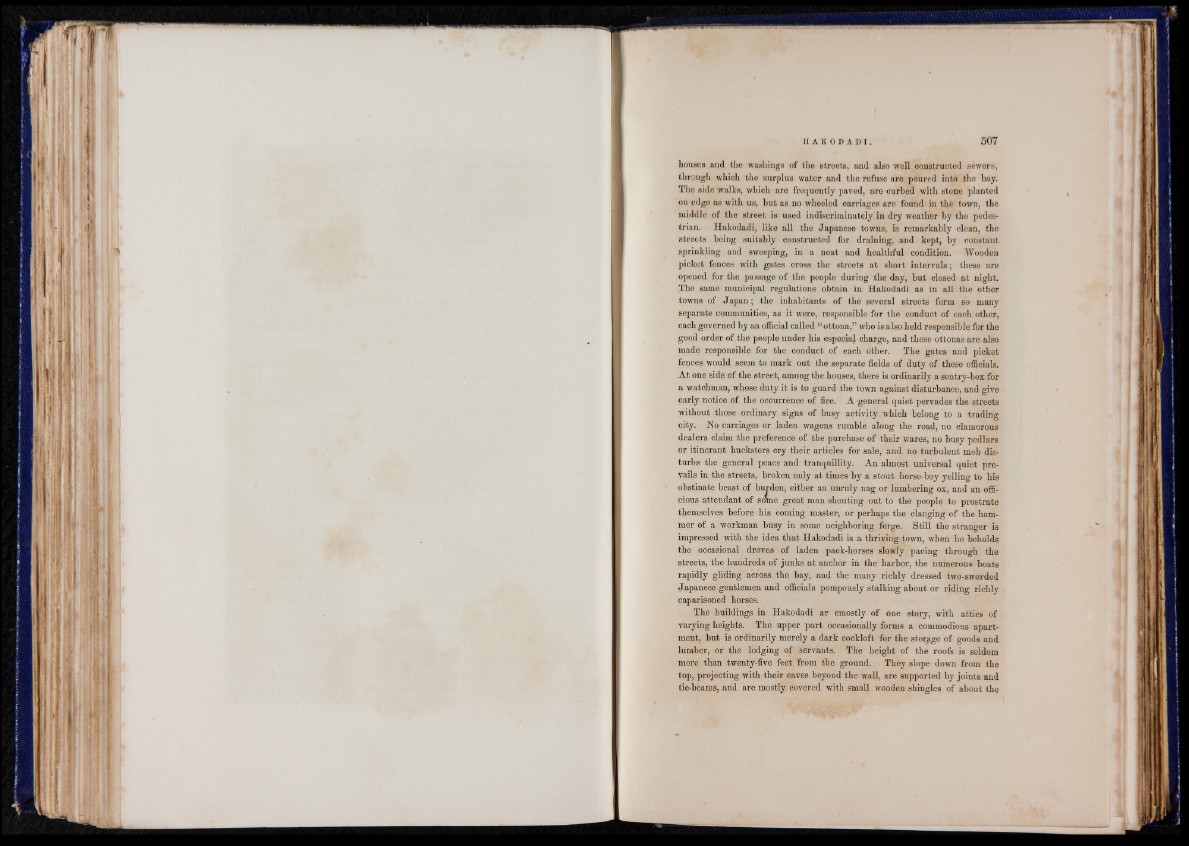
houses and tho washings of the streets, and also well constructed sewers,
through which the surplus water and the refuse are poured into the bay.
The side walks, which are frequently paved, are curbed with stone planted
on edge as with us, but as no wheeled carriages are found in the town, the
middle of the street is used indiscriminately in dry weather by the pedestrian.
Hakodadi, like all the Japanese towns, is remarkably clean, the
streets being suitably constructed for draining, and kept, by constant
sprinkling and sweeping, in a neat and healthful condition. Wooden
picket fences with gates cross the streets at short intervals; these are
opened for the passage of the people during the day, but closed at night.
The same municipal regulations obtain in Hakodadi as in all the other
towns of Japan; the inhabitants of the several streets form so many
separate communities, as it were, responsible for the conduct of each other,
each governed by an official called “ ottona,” who is also held responsible for the
good order of the people under his especial charge, and these ottonas are also
made responsible for the conduct of each other. The gates and picket
fences would seem to mark out the separate fields of duty of these officials.
At one side of the street, among the houses, there is ordinarily a sentry-box for
a watchman, whose duty it is to guard the town against disturbance, and give
early notice of the occurrence of fire. A general quiet pervades the streets
without those ordinary signs of busy activity which belong to a trading
city. No carriages or laden wagons rumble along the road, no clamorous
dealers claim the preference of the purchase of their wares, no busy pedlars
or itinerant hucksters cry their articles for sale, and no turbulent mob disturbs
the general peace and tranquillity. An almost universal quiet prevails
in the streets, broken only at times by a stout horse-boy yelling to his
obstinate beast of burden, either an unruly nag or lumbering ox, and an officious
attendant of some great man shouting out to the people to prostrate
themselves before his coming master-, or perhaps the clanging of the hammer
of a workman busy in some neighboring forge. Still the stranger is
impressed with the idea that Hakodadi is a thriving town, when he beholds
the occasional droves of laden pack-horses slowly pacing through the
streets, the hundreds of junks at anchor in the harbor, the numerous boats
rapidly gliding "across the bay, and the many richly dressed two-sworded
Japanese gentlemen and officials pompously stalking about or riding richly
caparisoned horses.
The buildings in Hakodadi ar emostly of one story, with attics of
varying heights. The upper part occasionally forms a commodious apartment,
but is ordinarily merely a dark cockloft for the storage of goods and
lumber, or the lodging of servants. The height of the roofs is seldom
more than twenty-five feet from the ground. They slope down from the
top, projecting with their eaves beyond the wall, are supported by joints and
tie-beams, and are mostly covered with small wooden shingles of about the